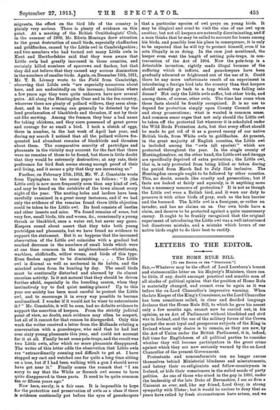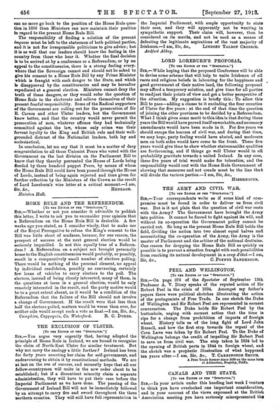LETTERS TO THE EDITOR.
THE HOME RULE BILL
[To THE EDITOR OF THE " SPECTATOR." I
Sta,—Whatever may be the effect of Lord Loreburn's honest and statesmanlike letter on his Majesty's Ministers, there can be little, if any, doubt amongst practical and sensible men of all shades of political opinion that the'position of Home Rule is materially changed, and cannot even be again as it was before the ex-Lord Chancellor's impressive warning. When the late Keeper of the King's Conscience, as the Lord Chancellor has been sometimes called, in clear and decided language declares that the Home Rule Bill, to which he gave his assent only a few months ago, cannot now be carried out, in his opinion, as an Act of Parliament without bloodshed and civil war in Ireland, and the use of the military forces of the Crown against the most loyal and prosperous subjects of the King in Ireland whose only desire is to remain, as they are now, by the Act of Union under the British Parliament, it is, indeed, full time for Englishmen of all political parties to consider whether they will become participators in the great crime against which they are now seriously warned by the ex-Lord Chancellor of the present Government.
Protestants and nonconformists can no longer excuse themselves behind Ministerial blindness and misstatements, and betray their co-religionists and fellow-countrymen in Ireland, or hide their consciences in the soiled sands of party politics. As one of those who stood in the gap in 1886, under the leadership of the late Duke of Devonshire, I am as firm a Unionist as ever, and, like my friend, Lord Grey, in strong sympathy with Ulster ; but it would be useless to deny that as years have rolled by fresh circumstances have arisen, and we can no more go back to the position of the Home Rule ques- tion in 1886 than Ministers can now maintain their position In regard to the present Home Rule Bill.
The responsibility of finding a solution of the present impasse must be left to the statesmen of both political parties, and it is not for irresponsible politicians to give advice ; but it is as well that our leaders should know the feeling in the country from those who hear it. Whether the final decision is to be arrived at by a conference or a Referendum, or by an appeal to the constituencies, there is a strong feeling every- where that the Sovereign cannot and should not be asked to give his consent to a Home Rule Bill by any Prime Minister which is fraught with such danger to the State, and which Is disapproved by the constituencies and may be hereafter repudiated at a general election. Ministers cannot deny the truth of these dangers, or they would refer the question of Home Rule to the electorate and relieve themselves of their present fearful responsibility. Some of the Radical supporters of the Government are calling out for the prosecution of Sir E. Carson and other Ulster leaders, but the Government know better, and that the country would never permit the prosecution of men, whatever offence they had technically committed against the law, whose only crime was their fervent loyalty to the King and British rule and their well- grounded distrust of the Nationalist leaders, both lay and ecclesiastical.
In conclusion, let me say that it must be a matter of deep congratulation to all those Unionist Peers who voted with the Government on the last division on the Parliament Bill to know that they thereby prevented the House of Lords being flooded by three hundred puppet Peers, by means of whom the Home Rule Bill could have been passed through the House of Lords, instead of being again rejected and time given for further reflection by the Ministers of the Crown as the result of Lord Loreburn's wise letter at a critical moment.—I am,











































 Previous page
Previous page